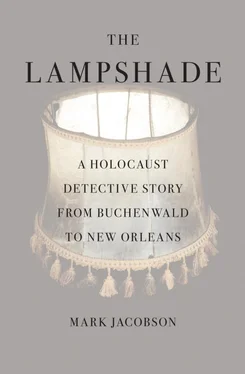“But I didn’t choose Ilsa, she chose me,” said Thorne, whose credits include Sin in the Suburbs, Blood Sabbath, The Swinging Barmaids, and Hellhole . “I studied at the Actors Studio with Lee Strasberg. We all wanted to play Shakespeare, to be Blanche DuBois in Streetcar Named Desire . But Ilsa, She Wolf of the SS was what I was offered. That is the way the business works. Say what you want, but it was a starring role and I wasn’t going to turn my nose up at that. I’ve taken some flak over the character. A few people stopped talking to me. There were stares in the supermarket. But I never saw Ilsa the way others did. I always thought of her as a female James Bond, an exotic woman of action. It is the responsibility of the actor to see a character from different sides, to be aware of the saving grace in them.”
Remembering afternoons inside the sticky-floored Selwyn Theatre on Forty-second Street when I sat between snorers and outpatients watching Ilsa dribble through a golden shower scene with a snivelingly kinky SS general, I wondered what Dyanne Thorne, who seemed like a very nice person, found to be Ilsa’s saving grace.
Thorne laughed. “Well, she is a very strong-minded individual. A strong woman character. That’s what you get when you take out the politics, isn’t it? A woman who’s in charge . Someone who scares the hell out of the men. Don’t look at her the wrong way or she’ll pull your skin off— that’s power . That’s Medea. Catherine the Great. I never imagined that Ilsa was something anyone would want to emulate. She isn’t what you might call a role model. That’s one reason I insisted Ilsa die at the end. She has to get what is coming to her.
“Still, Ilsa has been good to me. I get so many fan letters! I can’t even answer them all. Fans send me such lovely artwork, pictures of me as Ilsa. What imaginations they have! I’m always flying to one film convention or another. We just got back from the Cleveland Cinema Wasteland convention. Everyone was so nice to us. They treat me like a homecoming queen. Maybe that is Ilsa’s saving grace: I don’t know if it’s nostalgia or what, but she makes people happy. Strange as it sounds, Ilsa is a beloved character.”
Since her last film appearance in 1987, playing James Belushi’s deeply cleavaged transsexual father in Real Men, Thorne has earned a Ph.D. in comparative religion, become an ordained nondenominational minister, and along with her husband, musician Howard Maurer, currently runs A Scenic Wedding, a Las Vegas—based wedding planning business. Billing themselves as “an alternative to chapels,” the Maurers stage what are called “fantasy weddings.”
“We’ve done them in canyons, on the shores of Lake Mead, with hot-air balloons. What I tell our clients is the only limit is your imagination,” said Thorne, describing a recent wedding she and her husband presided over in a nearby forest, on horseback. To listen to her talk about it, the wedding, with unicorn-like trappings, had a distinctly Renaissance faire feeling to it.
“On horseback, like Ilsa,” I threw in.
“We do a lot of weddings on horseback, deep in the forest; it is very popular. Everyone has a ball,” Thorne said, pointing out that, as an accomplished horsewoman, she handled all the riding and stunts in the Ilsa movie herself.
Hearing this, it was difficult not to recall “the fantasy wedding” of the real Ilse Koch, to Karl Koch at midnight in the woods behind Sachsenhausen, with the steel helmet, the rings bearing runic symbols, the bread and salt, the white-gloved SS men.
“When you marry people, do they know you were Ilsa?”
“A lot of them do,” Dyanne Thorne answered. “It’s a kick, I suppose, getting married by Ilsa… but no one has ever asked me to dress up as Ilsa to marry them.”
“Would you? If they did ask?”
Dyanne Thorne thought a moment. “Well, we’re in business to give people the wedding they want. If Ilsa is their dream wedding, I guess I’d have to think about it.”
• • •
I had an address for Uwe Köhler, Ilse Koch’s son, in Bavaria, east of Regensburg.
Born in Landsberg Prison in October 1947 following his mother’s conviction, Köhler was Ilse Koch’s fourth child. Her first three children—a son, Artwin, and two daughters, Gisela and Gudrun—were born at Buchenwald, each successive year from 1938 to 1940. It is assumed that Karl Koch was the father of these children—a cradle embossed with back-to-back K s, donated by a local family, is in Wolfgang Röll’s special collection at Buchenwald—however there were many rumors concerning Karl Koch’s purported homosexuality, and Ilse almost certainly had a number of lovers. Prominent among these alleged paramours were the deputy camp commander, Hermann Florstedt, and the camp doctor, Waldemar Hoven.
The brutal, gawk-necked Florstedt was Karl Koch’s chief lieutenant/henchman at both Sachsenhausen and Buchenwald before replacing his disgraced boss as head of Majdanek, where he would preside over a murderous regime that set the stage for the horrific “Operation Harvest Festival,” a mass killing spree that peaked on November 3, 1943, when eighteen thousand Jews were reported to have been shot. Hoven was another sort of Nazi. Darkly handsome in a tragically Teutonic, Gregory Peck mode, the ascot-wearing Hoven traveled in the United States, where he sought a career as a Hollywood romantic actor. Failing this, he returned to Germany, joined the SS, and despite scant medical training became a camp physician. He was later convicted at Nuremberg for dispensing lethal injections to prisoners. Koch and Florstedt were shot by the Nazis as a result of the Konrad Morgen investigation; Hoven was hanged by the Allies. This makes Ilse Koch quite possibly the only woman ever to have sex with men put to death by opposite sides in a world war.
Nonetheless, in the story of Ilse Koch, the conception and birth of Uwe Köhler remains a singular event.
Prosecutors at the Dachau war crimes trial were dumbfounded when the forty-one-year-old former Kommandeuse announced in open court that she was pregnant. This seemed impossible, even for the supposedly insatiable Bitch of Buchenwald. As the only woman among the thirty-one defendants at Dachau, she had been locked up in an isolated, heavily guarded cell. The disclosure set off a tabloid firestorm. The court officers believed the father might be Josef Kirschbaum, one of the military interrogators, a Jew. Could Ilse Koch be so man-hungry that she would welcome the company of a Volk -defiling Hebrew? Joshua M. Greene in his book about the trial, Justice at Dachau, writes that Koch’s mystery lover was likely a prison kitchen worker who “dug a hole to her barracks,” tunneling his way into the arms of the Kommandeuse.
The paternity question was never settled. Koch refused to talk about it. It was as if the birth were a magic thing, the uncoiling of the malign spirit that, in keeping with the vows sworn by Ilse and Karl during their midnight wedding, dwelled in the womb of SS women.
This was some onerous existential baggage with which to begin life’s journey, I thought as I drove south through Bavaria to the town where I’d been told Uwe Köhler lived. Taken from his mother almost immediately after his birth, raised in a succession of foster homes, Köhler (Ilse Koch’s maiden name) was unaware of his parentage until shortly after his nineteenth birthday, when he saw a newspaper article headlined, “No Pardon for Ilse Koch.” Recognizing the name from his birth certificate, Köhler did some checking and in 1966 made contact with Ilse, then entering her sixteenth year of incarceration.
It was with “a creepy feeling” that he first approached the looming old Aichach prison one dank morning shortly before Christmas, Köhler told New York Times reporter David Binder in 1970. He wasn’t sure what kind of reception he would get from this person who supposedly turned men into lampshades and also happened to be his mother. As it turned out, Köhler told Binder, it was “a joyous reunion” and he began to visit Koch every month, which was all the law allowed. Insisting on her blamelessness, Koch sent her son several poems she’d written in jail. One poem, entitled “Innocence,” goes: “Still they keep me bound / counter to all justice / when guilt cannot be found…” One day, she writes, her fate will be “reversed,” with honor paid to those who were “cursed,” Hell’s torments at an end, right “installed again.”
Читать дальше












